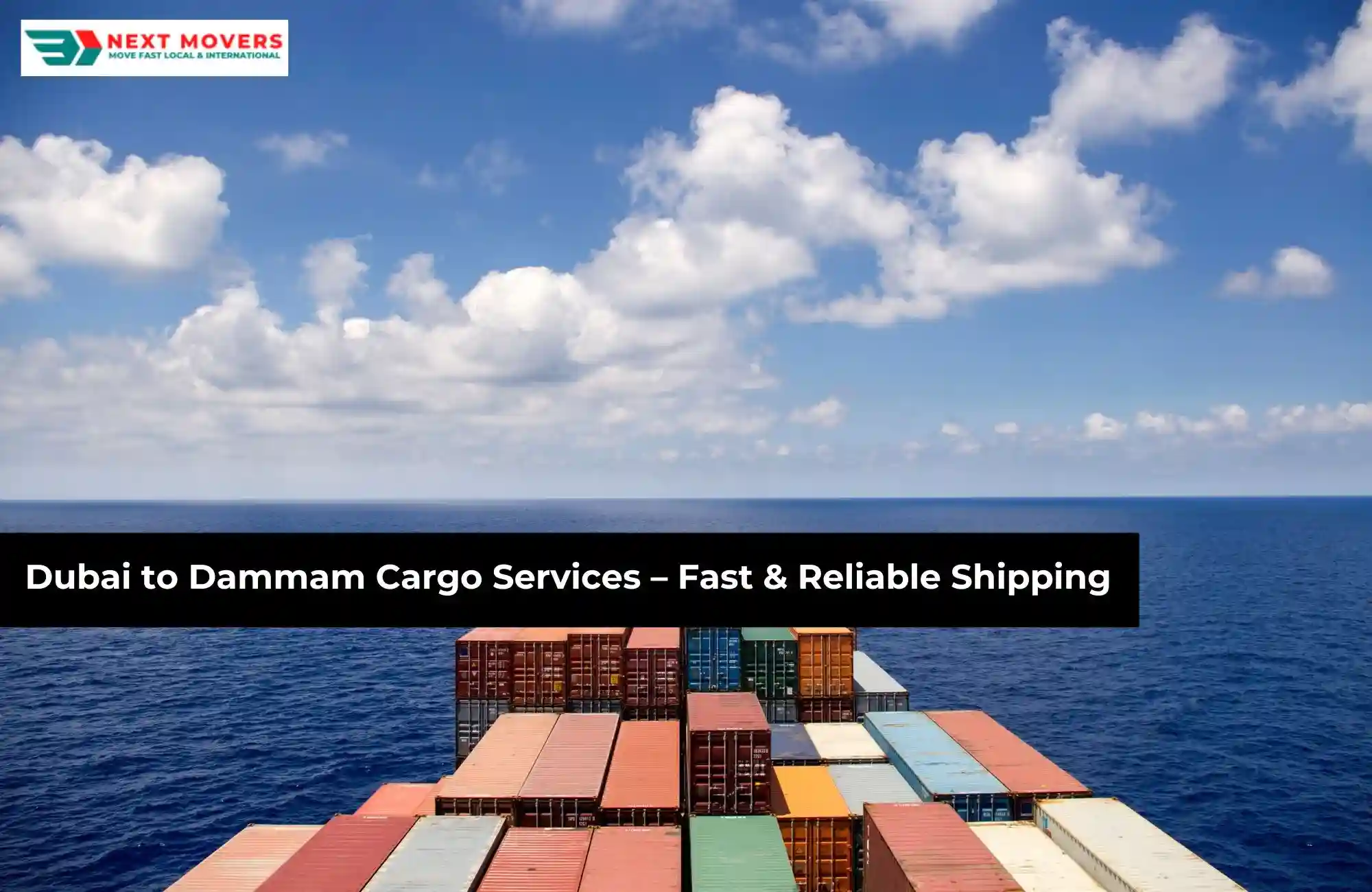Cargo to Saudi Arabia From Dubai: The Ultimate Guide by Next Movers
Shipping cargo from Dubai to Saudi Arabia is a critical part of the trade ecosystem between the UAE and Saudi Arabia. This route serves as a bridge for businesses, retailers, and individuals looking to transport goods efficiently across borders. With its strategic location and advanced logistics infrastructure, Dubai is a global hub for freight and shipping services, offering various solutions for transporting goods to neighboring Saudi Arabia. This guide from Next Movers will help you understand the entire cargo shipping process, covering methods, costs, regulations, and tips to make your shipping experience as smooth and cost-effective as possible.
Why Shipping Cargo from Dubai to Saudi Arabia is Essential
The UAE and Saudi Arabia maintain robust trade relations, with Dubai playing a crucial role in facilitating cargo shipments between the two countries. Dubai’s proximity to Saudi Arabia, combined with its advanced logistics network, makes it a favorable hub for trade. Additionally, the ease of transportation, whether by land, sea, or air, further enhances the efficiency of cargo movements.
Businesses in sectors like construction, automotive, electronics, and consumer goods frequently ship products to Saudi Arabia from Dubai. With a thriving trade and fast-moving market, Dubai’s strategic position supports the transportation of goods in various quantities and sizes.
Key Methods of Shipping Cargo to Saudi Arabia from Dubai
There are three primary methods for shipping cargo from Dubai to Saudi Arabia: air freight, sea freight, and land freight. Each of these methods has its advantages, depending on factors such as speed, cost, cargo type, and shipment size.
Air Freight: Fastest Shipping Method
Air freight is the quickest method for shipping cargo between Dubai and Saudi Arabia. If you need to ship goods urgently or send time-sensitive products like perishable items, medical supplies, or high-value goods, air freight is the best option. Air freight typically takes 1-3 days to transport goods from Dubai to major airports in Saudi Arabia such as King Abdulaziz International Airport (Jeddah) or King Khalid International Airport (Riyadh).
The primary advantage of air freight is speed, but it comes at a higher cost compared to other shipping methods. It is ideal for smaller, high-priority shipments that need to reach their destination quickly.
Sea Freight: Ideal for Large Shipments
Sea freight is the most common and economical option for large, bulky, or heavy shipments. Whether it’s construction materials, machinery, or large consumer goods, sea freight offers ample space and is ideal for businesses needing to ship a significant volume of goods. This method typically takes between 5-7 days, depending on the specific port of departure and arrival.
Dubai’s strategic location along the Arabian Gulf provides direct access to major Saudi ports such as Jeddah, Dammam, and King Abdulaziz Port. Sea freight offers both Full Container Load (FCL) and Less-than-Container Load (LCL) services, making it suitable for both large and smaller shipments.
Sea freight is the most cost-effective method for businesses with high-volume cargo but requires more time for delivery. The key factors influencing the cost of sea freight include the size and weight of the shipment, the choice of FCL or LCL, and port handling fees.
Land Freight: Convenient for Short Distances
Land freight, which involves trucking goods from Dubai to Saudi Arabia, is a viable shipping option due to the short distance between the two countries. With only a few hours’ drive separating Dubai and major cities in Saudi Arabia like Riyadh, Jeddah, and Dammam, land freight is a practical and affordable choice for many shipments.
This method typically takes 8-10 hours, depending on the final destination within Saudi Arabia. Land freight is a good option for transporting large or heavy items that do not require urgent delivery. It’s also ideal for cargo that needs to be transported directly to its destination without transshipping through ports or airports.
Factors Affecting the Cost of Cargo Shipping from Dubai to Saudi Arabia
The price of delivering goods from Dubai to Saudi Arabia depends on a number of factors. Understanding these factors can help you choose the most cost-effective shipping option and avoid unexpected expenses. The primary cost factors include:
1. Weight and Volume of the Cargo
The size and weight of your cargo are key determinants in calculating shipping costs. Heavier or larger shipments typically incur higher shipping fees. For air freight, both the actual weight and volumetric weight (calculated based on dimensions) are considered when determining the cost. Sea and land freight services generally calculate costs based on the volume or the space your cargo occupies in the container or truck.
2. Shipping Method
The most costly way to move cargo is by air, while sea freight comes in second. Land freight, while slower than air freight, is often the most cost-effective option for shorter distances. The urgency of the shipment is another crucial factor. If you need your cargo delivered quickly, air freight may be the only viable choice, though it comes with a higher price tag.
3. Customs Duties and Taxes
Import duties, taxes, and customs clearance fees play a significant role in the overall cost of shipping cargo to Saudi Arabia. The Saudi government imposes customs duties on most imported goods, and the rates depend on the type of goods being shipped. Customs duties typically range from 5% to 20%, depending on the classification of the goods.
Additionally, Value Added Tax (VAT) at a rate of 15% is applied to most goods entering Saudi Arabia. It is important to be aware of these charges to avoid unexpected costs when shipping goods. Partnering with a professional logistics provider like Next Movers can help you navigate customs procedures efficiently.
4. Insurance
Shipping insurance is recommended to protect your goods from potential damage or loss during transit. The cost of insurance is typically a small percentage (1-2%) of the cargo value, depending on the value of the items being shipped and the shipping method used. While insurance is not mandatory, it is an important safeguard, especially for high-value or fragile goods.
5. Delivery Time
Delivery time can also affect shipping costs. Air freight offers faster delivery, but it is more expensive. Sea and land freight are slower but more affordable. If you are shipping urgent goods, you will need to opt for air freight, but for non-urgent shipments, sea or land freight are more economical options.
Customs Clearance and Documentation for Shipping to Saudi Arabia
When shipping cargo from Dubai to Saudi Arabia, complying with customs regulations is essential to ensure smooth and timely delivery. The customs clearance process requires certain documents to be submitted, and failure to provide accurate information can result in delays or additional charges. Here are the essential documents needed for shipping cargo to Saudi Arabia:
1. Commercial Invoice
One of the most crucial documents for customs clearance is the commercial invoice. It outlines the details of the goods being shipped, including their value, description, quantity, and the buyer and seller’s information. Customs authorities in Saudi Arabia use this invoice to determine the applicable duties and taxes on the shipment.
2. Certificate of Origin
The nation in which the items were created or manufactured is attested by a certificate of origin. It is required for customs clearance in Saudi Arabia, especially for shipments that may be subject to preferential trade agreements.
3. Bill of Lading
A Bill of Lading (BOL) is a legal document issued by the carrier, serving as proof of receipt of the cargo for shipment. It also acts as a contract that specifies the terms and conditions of transportation between the shipper and the carrier.
4. Packing List
A detailed packing list is necessary for customs inspection and to help verify the contents of the shipment. The packing list includes a description of the cargo, packaging type, and the total number of items being shipped.
5. Import Permits
Depending on the type of goods being shipped, you may need to obtain specific import permits or licenses from Saudi authorities. Certain products, such as pharmaceuticals or chemicals, may require additional documentation or certification to comply with Saudi import regulations.
Tips for Efficient Cargo Shipping to Saudi Arabia
To ensure a smooth and efficient cargo shipping experience, consider the following tips:
1. Choose a Reliable Shipping Partner
Work with a trusted shipping company like Next Movers to ensure that your cargo is handled professionally. A reliable logistics provider will assist with paperwork, customs clearance, and tracking, making the shipping process much easier.
2. Ensure Proper Packaging
Proper packaging is essential to protect your goods during transit, especially for items that are fragile or sensitive. The packaging should meet the standards required by the shipping method and ensure that the goods remain intact during the journey.
3. Plan for Customs Clearance
Be prepared for the customs clearance process by ensuring that all required documents are completed accurately and submitted on time. Any discrepancies or missing information can cause delays at customs.
4. Track Your Shipment
Tracking your cargo shipment is a great way to stay updated on its progress. Many shipping companies offer real-time tracking, allowing you to monitor the status of your shipment and anticipate delivery times.
Conclusion
Shipping cargo from Dubai to Saudi Arabia is a straightforward process when you understand the available shipping methods, costs, and regulations. Whether you choose air freight for urgent shipments, sea freight for larger volumes, or land freight for its cost-effectiveness, the key is to work with a reliable logistics provider like Next Movers. By following the guidelines and tips outlined in this guide, you can ensure that your cargo reaches its destination efficiently, cost-effectively, and on time.





